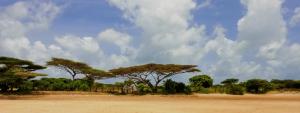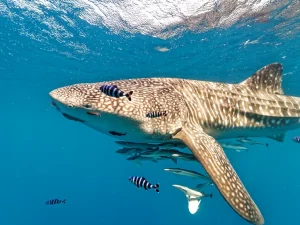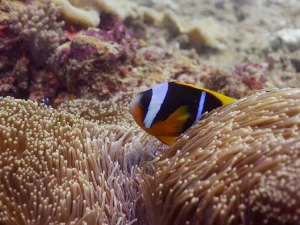
Grants
Marine Conservation
Kinyika Co-Managed Marine Area
£2000 awarded
Lamu Marine Conservation Trust (LAMCOT) are embarking on an exciting project with the support of the local community to create a protected area around Kinyika Rock.
Kinyika lies one kilometre off the coast of Lamu and Manda islands and is made up of small rocky outcrops and large swathes of coral reefs. Seafaring birds use Kinyika as a refuge and nesting ground, below the waves there is a protected coral garden with colourful reef fish and nurseries. On the outer reef, huge shoals of larger fish and pelagic can be found. Rare breeds have been spotted including Hump Head Parrotfish, Napoleon Wrasse, Black and White Tipped Sharks and Whale Sharks. The island is also often visited by pods of dolphins.

This diverse eco-system is under threat through an amalgamation of global climate changes and local environmental practices. The area is highly fished for octopus, lobsters, ornamental fish, and commercially important fish. Overfishing around Kinyika has grown due to an increasing number of fishers coming from the southern coast of Kenya, and as far as Tanzania. A further threat is destruction from boat anchors, nets, and other unsustainable fish gears such as spear guns. All these factors have contributed to declining fish stocks.
The declining catch drove stakeholders to come up with a solution to protect Kinyika for generations to come. LAMCOT will work in collaboration with relevant government departments and CORDIO marine scientists to provide technical guidance and support for stakeholders to create a sustainable co-management plan.
Already, LAMCOT have initiated stakeholder forum meetings to discuss the best ways to use Kinyika resources to increase people’s livelihood without compromising the future generation from enjoying the same. This project will unfold over a minimum of 4-years as the key to success is to have strong buy-in from the community and to be community-led.
The projects will begin by strengthening the governing capacity of Beach Management Units (BMUs) and bringing together all stakeholders to work in cohesion for the long-term benefit of their immediate environment. After that, a management team will be identified who will be led by LAMCOT who will support with technical knowledge.
Due to the ambitious nature of this project, long-term funding and partners will need to be sought to ensure the success of this project. As well as funding, LEF will be providing support in identifying relevant partners and co-funders for this project.

